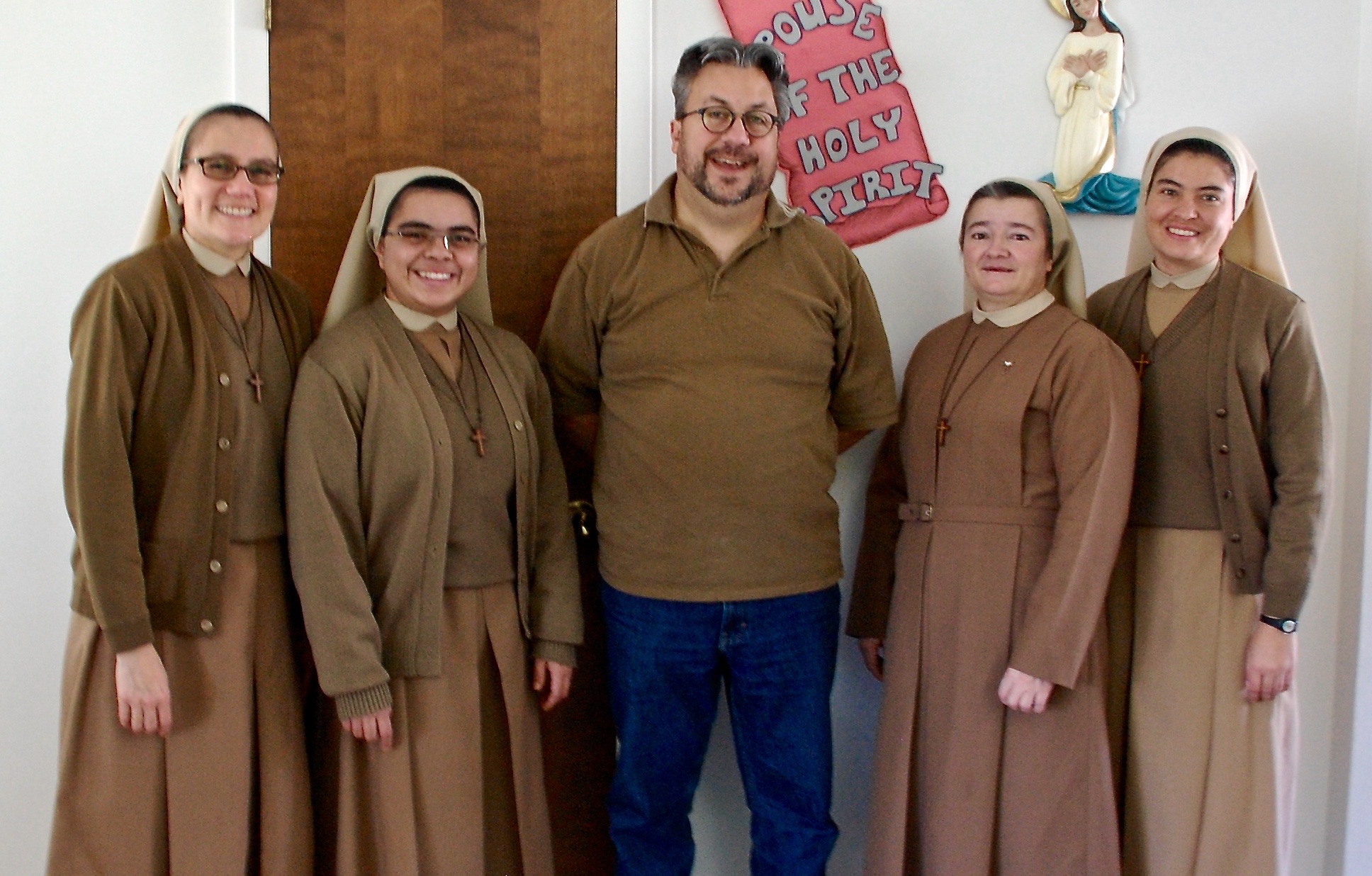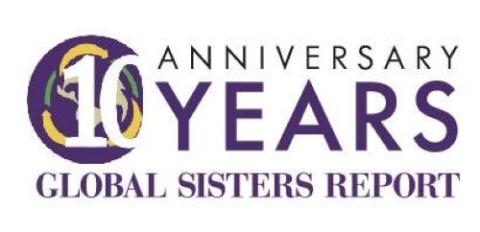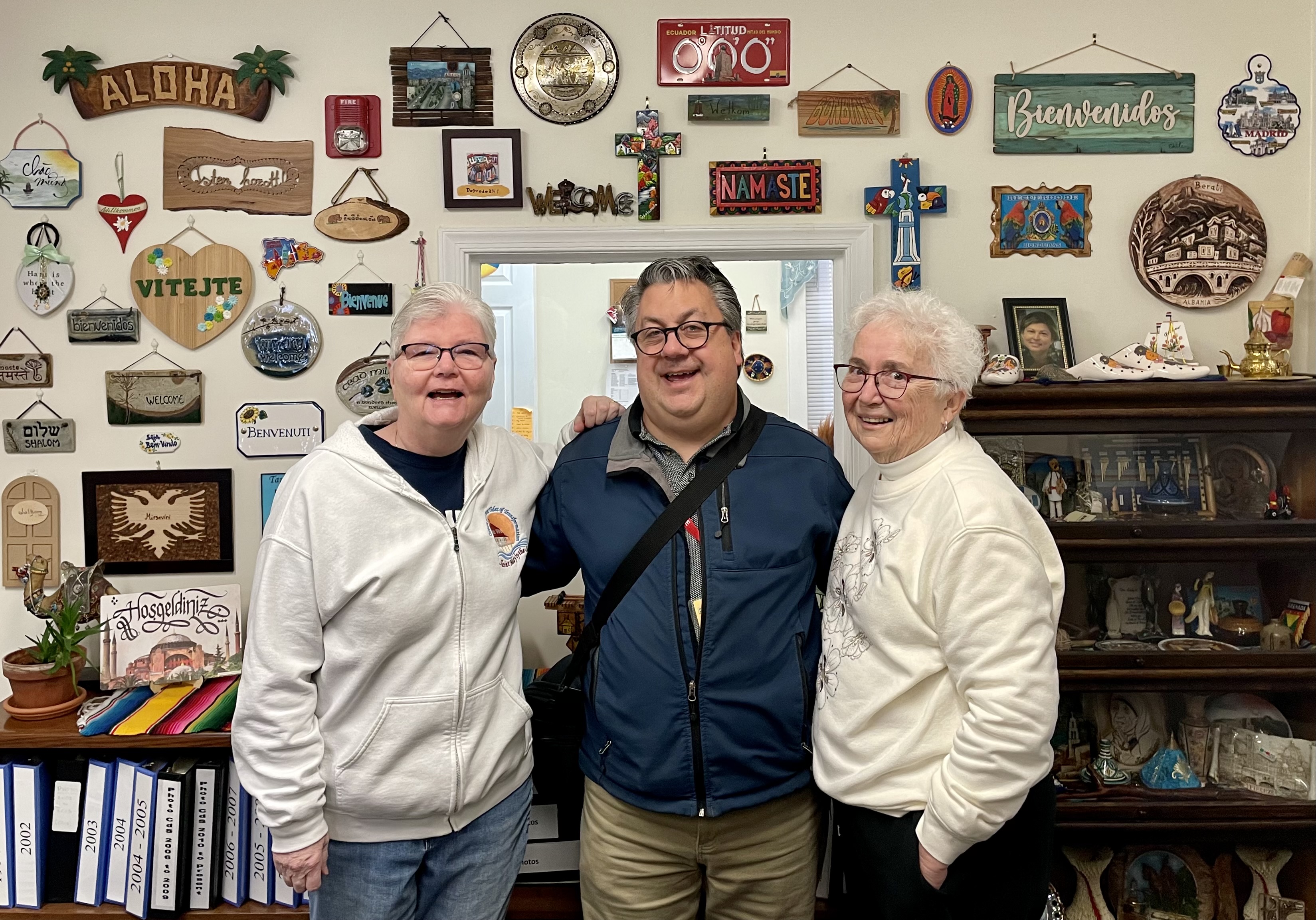
Dan Stockman, national correspondent for Global Sisters Report, stands with Missionary Servants of the Divine Spirit sisters in Michigan in 2015. (Courtesy of Dan Stockman)
Editor's note: Global Sisters Report, the dynamic online community that reports on and gives voice to Catholic women religious around the world, is celebrating its 10th anniversary this year. Join us as we take another look at stories and columns published in 2014 with new updates and reporting.

I've been a professional journalist for 29 years, and for most of those years I've been a beat reporter.
For those who haven't spent their careers in a newsroom, a beat reporter is a journalist who covers the same thing over and over — like a cop "walking the beat," you learn the ins and outs, who the players are, who the publicly powerful people are and who are the powers behind the scenes. You learn who the experts are, and who you can talk to off the record just to better understand the context or what is really happening.
Those of us in the business a long time like to say that after a year on a beat, you finally feel like you are starting to understand things. After two years on a beat, you realize how little you knew after only a year and how much more you have to learn. After three years, you start to gain an actual understanding of how things work. You've started to build relationships and information networks. Sources sometimes start asking you questions about how things really work.
At the beginning, it seems like anniversaries of five and 10 years are incomprehensibly far off. But I've learned that while minutes and hours crawl by, years fly past in an instant.
If Catholic women religious continue to set the example for what the church can be — and they will — we will all be far richer than we can imagine.
Ten years ago, my children were just 8 and 10 years old. My wife and I were, ahem, 10 years younger than we are now. I had spent 19 years working in daily newspapers, and I had just started a job at a brand-new publication, Global Sisters Report.
I went from the municipal government beat — things like property taxes, sewer systems, zoning laws and city councils were my daily life — to covering Catholic women religious.
And what a first year.
Location may be everything in real estate, but timing is everything in the news business, and Global Sisters Report was born at a busy time, indeed.
In 2014, the Vatican's investigations of sisters in the United States were at their peak: The apostolic visitation looking into all sisters here, which began at the end of 2008 and the doctrinal assessment of the Leadership Conference of Women Religious, which at the time represented about 80% of the nation's sisters. That probe also mentioned the Network Catholic social justice lobby and the Resource Center for Religious Institutes.
By 2012, the report of the apostolic visitor, Apostles of the Sacred Heart of Jesus Sr. Mother Mary Clare Millea, had been submitted to one Vatican dicastery. Another announced it was demanding reforms at LCWR, appointing Seattle Archbishop Peter Sartain to oversee the changes it was demanding. LCWR officials committed to "open and honest" dialogue with Sartain, but said they would maintain their organizational integrity — a diplomatic way of saying they would cooperate but make their own decisions, thank you very much.
In April 2014 — just a week after Global Sisters Report began to publish — Cardinal Gerhard Müller, prefect of the Congregation for the Doctrine of the Faith, ordered that after that year's assembly, speakers at the group's events must be approved by Sartain, citing LCWR's selection of feminist theologian Sr. Elizabeth Johnson for the Outstanding Leadership Award that year as one reason for the mandate.
Fortunately, the question of whether allowing a bishop to veto conference speakers would end LCWR's organizational integrity never had to be answered: The five-year reform mandate imposed in 2012 ended two years early in April 2015, with a report largely praising LCWR's work and saying "the Commitment of LCWR leadership to its crucial role in service to the mission and membership of the Conference will continue to guide and strengthen LCWR's witness to the great vocation of Religious Life, to its sure foundation in Christ, and to ecclesial communion." Sr. Sharon Holland, LCWR president at the time, later said LCWR officials themselves were "the prime authors of that report," and that the "cultural chasm" that caused the mandate was changing dramatically. They had gone from an existential crisis to being integral.
That major turn of events came on the heels of the apostolic visitation ending in December 2014: Like the LCWR report that would come later, this one praised the work of sisters in the United States. Holland said then the visitation report "is not a document of blame, or of simplistic solutions. One can read the text and feel appreciated and trusted to carry on."
Of course, 2014 also brought issues such as the immigration crisis at the U.S. southern border and the transformation of congregations to deal with the declining number of sisters. Those issues haven't gone away in the last decade.
To say it was a lot to take in for a reporter new to the beat is a vast understatement. And those were just the events and issues that were going on — there was also the incredible shift of landscape for a reporter going from reporting on a mayoral ribbon cutting one day and malfeasance at a local nonprofit the next to reporting on Catholic sisters and the incredible work they do.
Believe me, I'll take writing about nuns over thugs and politicians any day.

Dan Stockman, national correspondent for Global Sisters Report, stands with St. Joseph Sisters of Philadelphia in March 2024. (Courtesy of Dan Stockman)
Which leads me to the question I was asked very often during that first year and still am asked once in a while: What are sisters really like?
In September 2014, I wrote a column about it, and said that I usually tell people that sisters are like librarians: Society has a stereotype of librarians as quiet and unassuming but they are, in fact, filled with a steely resolve and endless dedication to principle. The same with sisters: I wrote that society's stereotype hides their "unshakeable strength and unending mercy. They are saving the world and never once seeking attention for doing so. They will not be dissuaded — by anyone — from their work, and they are relentlessly hopeful."
Ten years later, I not only stand by those remarks, but am more certain of them than ever. While social media goes bonkers over videos of habited sisters dancing to pop anthems — "Nuns dance! Who knew?" — sisters are bringing food to the hungry, companionship to the lonely, medicine to the sick and hope to the hopeless.
They are running health systems and universities, helping steer the United Nations, chairing foundations and nonprofits, and lobbying Congress. Chances are good the Affordable Care Act would not have passed without the support of sisters, and tens of millions of people would still be without health insurance.
When I go to LCWR's annual assembly, I know I'm likely the least educated person there, as these women often have multiple master's degrees and sometimes even multiple doctorates. They are astonishing, and somehow also humble and down to earth.
Advertisement
Yes, the number of sisters continues to return to historical norms, but they are also gracefully creating a new world for lay people: Not long ago, unless I was willing to take vows, my participation in the Catholic Church was largely limited to sitting in a pew and maybe joining an organization. Today, sisters have created a myriad of associate programs that let me maintain my vows to my wife and family while also being part of a religious congregation's charism. I can be part of a sponsored ministry or a former ministry that is now a standalone entity living out that charism. I can volunteer with them or partner with them on projects neither of us could complete alone. Sisters have created a new reality for lay people to live out their faith, just as a seed falls to the earth and creates new life.
Some sisters I've written about have become longtime friends, some have become dear friends, and all of them leave me in awe: In awe of them, in awe that I have a career where I get to write about them, and in awe of all that they do while never asking for recognition.
These 10 years have flown by. If the next 10 are in any way as rich and fulfilling, I will have had a most amazing career, indeed. More importantly, if Catholic women religious continue to set the example for what the church can be — and they will — we will all be far richer than we can imagine. It is a deep honor that we get to help tell their story.





